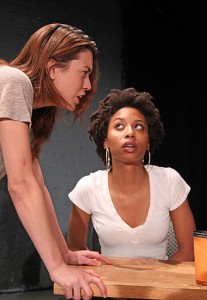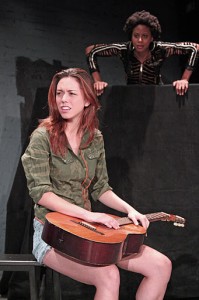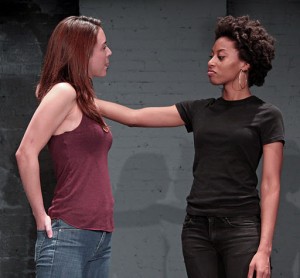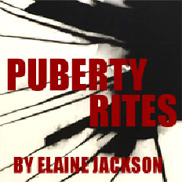CONSTANT CATFIGHTS
Race is a subject loaded with potential drama. This season alone, there has been a cornucopia of plays staged in New York featuring storylines involving race. They include The Submission, Burning, Any Given Monday, and Sons of the Prophet, to name a few.
Adding to this ever growing list is Puberty Rites, a theatrical offering currently running at the Castillo Theater that exploits black and white racial tensions in the form of two aggressive teenage girls from different sides of the tracks.
 Keesha (Yasha Jackson) is a no-nonsense, tough talking, eye rolling, hand-on-her-hip ghetto girl. She lives in a three-room apartment with eight other family members consisting of several generations of single mothers and their offspring.
Keesha (Yasha Jackson) is a no-nonsense, tough talking, eye rolling, hand-on-her-hip ghetto girl. She lives in a three-room apartment with eight other family members consisting of several generations of single mothers and their offspring.
Understandably, like anyone forced to live in such tight quarters, Keesha is angry. Not so much because she often has to help care for her nieces and nephews, and not because the guy she’s been dating for eight months, Tyrelle, has knocked up his “other” girlfriend. On the contrary, when Keesha finds out about the the “baby mama,” she suspects that it was Tyrelle himself who asked the other woman to inform her about it. Keesha loves her “nigga” all the more for his alleged “honesty.”
 What does make Keesha angry is being told what to do. She has a problem with authority, and her rebellion against the powers that be recently got her thrown out of English class. She’s also not too thrilled about the changes at her high school. Since the school’s re-branding as a “Magnet School,” there’s been an influx of white students, and the school has undergone an extreme makeover. There’s a new swimming pool, new gym, student trips all over the world, musical instruments, and new uniforms. Keesha wouldn’t mind the improvements if they weren’t part of a package deal that included welcoming the “Hill People.”
What does make Keesha angry is being told what to do. She has a problem with authority, and her rebellion against the powers that be recently got her thrown out of English class. She’s also not too thrilled about the changes at her high school. Since the school’s re-branding as a “Magnet School,” there’s been an influx of white students, and the school has undergone an extreme makeover. There’s a new swimming pool, new gym, student trips all over the world, musical instruments, and new uniforms. Keesha wouldn’t mind the improvements if they weren’t part of a package deal that included welcoming the “Hill People.”
One of the people who has come down from the hill to the hood is Vesna (Ariele Uppaluri), a white, 18-year-old daughter of a successful architect and a social worker. Vesna has problems of her own: her parents have adopted one of her mother’s “social work experiments” and moved him into Vesna’s room, forcing her to sleep in the carriage house. To make matters worse, according to Vesna, her mother is having an affair with her newly adopted son, and her “faggot” Dad either doesn’t notice or, like Keesha, doesn’t seem to care when his significant other spreads the love.
Distraught by recent these recent developments, Vesna leaves home and takes up residence in a fountain located behind Keesha’s apartment complex. When Keesha discovers her, the two almost immediately begin peppering one another with insults in an apparent attempt to see who can be more offensive.
Vesna: ”’¦Black Bitch!”
Keesha: ”’¦Horse-faced albino maggot!”
Vesna: ”’¦Kinky-faced lump of brown’¦doo-doo!”
Keesha: ”’¦White, crack-head slut! Chicken-headed piece a’ shit!”
 I guess this is the 21st century version of “meeting cute.” Am I that far behind the times? In the age of Real Housewives and Bad Girls Club, perhaps this is what’s now considered a proper introduction. Otherwise, I’m not sure what would compel these two to continue “talking” to one another. But somehow, after a while, without either of the girls apologizing, Keesha invites Vesna to spend the night at her over-crowded apartment in order to keep Vesna from slitting her wrists.
I guess this is the 21st century version of “meeting cute.” Am I that far behind the times? In the age of Real Housewives and Bad Girls Club, perhaps this is what’s now considered a proper introduction. Otherwise, I’m not sure what would compel these two to continue “talking” to one another. But somehow, after a while, without either of the girls apologizing, Keesha invites Vesna to spend the night at her over-crowded apartment in order to keep Vesna from slitting her wrists.
As the play continues, we watch the girls bond, share their stories and offer help and advice to one another like only teenagers can. Vesna, it turns out, is a lot tougher than Keesha gives her credit for. Keesha, on the other hand, is all bark and no bite. During one of their arguments, Keesha literally draws a line on the ground and threatens the full force of her wrath if the line is crossed. Vesna calls Keesha’s bluff only to have Keesha move the line and continue with her empty threats.
Throughout most of this two-woman show, written by Elaine Jackson, Keesha and Vesna are at odds. As a result of their raging tempers and foul mouths, it doesn’t feel like we ever truly get to know who these characters are.
 There are rare moments when we get to see a gentler, more introspective layer of these girls’ personalities.
There are rare moments when we get to see a gentler, more introspective layer of these girls’ personalities.
Keesha: “You are the only other person I know with a live-in dad’¦I’ll take a piece of a daddy rather than no daddy.”
I only wish that these moments weren’t so few and far between, because the girls that we glimpse in those brief moments are the girls who we might want to spend 90 minutes with in the theater.
photos by Gerry Goodstein
Puberty Rites
Woodie King Jr’s New Federal Theatre at the Castillo Theatre
scheduled to end on November 20
for tickets, visit http://www.castillo.org/production_puberty.html

